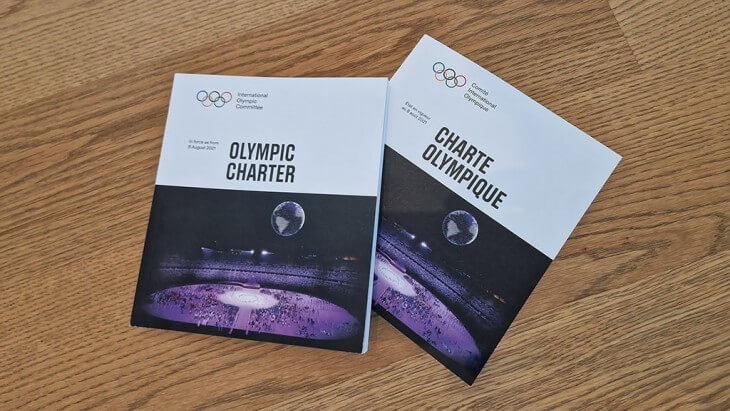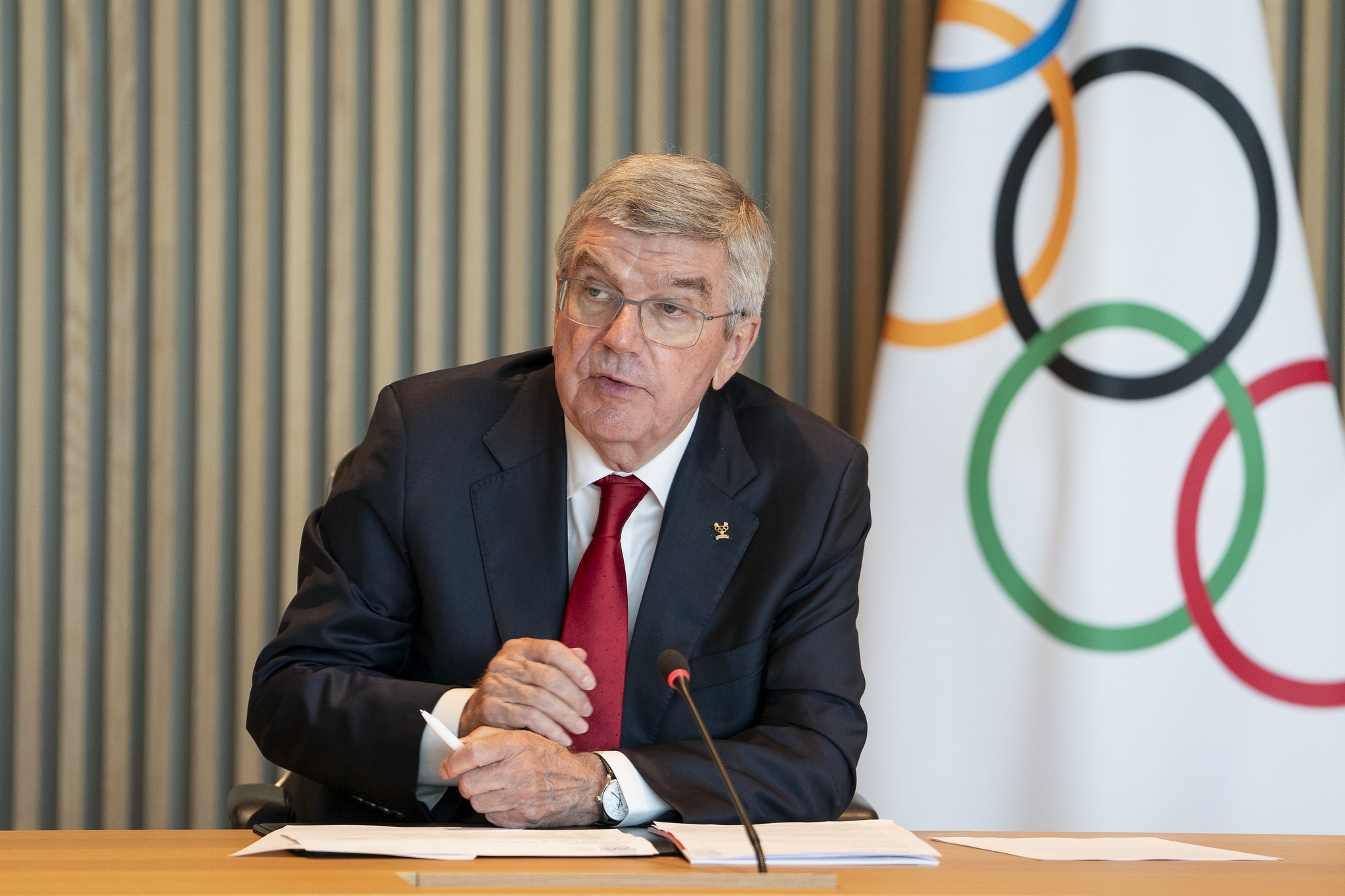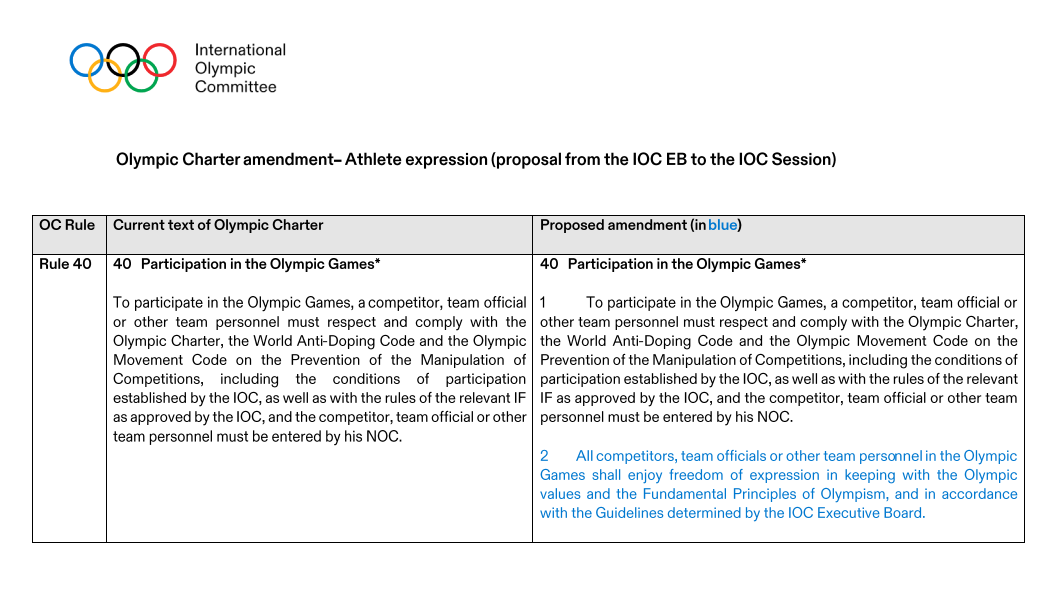Olympic Movement
20.10.2023
IOC proposes Olympic Charter changes to send "strong message" on human rights

-
Members of the discussion:
-
Last reply:
The International Olympic Committee (IOC) Executive Board has proposed changes to the Olympic Charter that aim to ensure respect for human rights and freedom of expression at the Olympic Games.
Plans have been submitted for approval at next month’s IOC Session to include additional wording in the Fundamental Principles of Olympism 1 and 4 which IOC President Thomas Bach claims present "a major step in our commitment to the respect for human rights in the Olympic Movement".
Under the proposals, the IOC wants to add the words "internationally recognised human rights" and "within the remit of the Olympic Movement".
Should the changes be approved at the IOC Session, the Fundamental Principle of Olympism 1 will read: "Olympism is a philosophy of life, exalting and combining in a balanced whole the qualities of body, will and mind.
"Blending sport with culture and education, Olympism seeks to create a way of life based on the joy of effort, the educational value of good example, social responsibility and respect for internationally recognised human rights and universal fundamental ethical principles within the remit of the Olympic Movement."
The IOC is also proposing to alter Fundamental Principle of Olympic 4 by replacing the words "the possibility of practising sport" with "access the practice of sport" and adding "in respect of internationally recognised human rights within the remit of the Olympic Movement".
The proposed wording for the article reads: "The practice of sport is a human right.
"Every individual must have access to the practice of sport, without discrimination of any kind in respect of internationally recognised human rights within the remit of the Olympic Movement.
"The Olympic spirit requires mutual understanding with a spirit of friendship, solidarity and fair play."
Plans have been submitted for approval at next month’s IOC Session to include additional wording in the Fundamental Principles of Olympism 1 and 4 which IOC President Thomas Bach claims present "a major step in our commitment to the respect for human rights in the Olympic Movement".
Under the proposals, the IOC wants to add the words "internationally recognised human rights" and "within the remit of the Olympic Movement".
Should the changes be approved at the IOC Session, the Fundamental Principle of Olympism 1 will read: "Olympism is a philosophy of life, exalting and combining in a balanced whole the qualities of body, will and mind.
"Blending sport with culture and education, Olympism seeks to create a way of life based on the joy of effort, the educational value of good example, social responsibility and respect for internationally recognised human rights and universal fundamental ethical principles within the remit of the Olympic Movement."
The IOC is also proposing to alter Fundamental Principle of Olympic 4 by replacing the words "the possibility of practising sport" with "access the practice of sport" and adding "in respect of internationally recognised human rights within the remit of the Olympic Movement".
The proposed wording for the article reads: "The practice of sport is a human right.
"Every individual must have access to the practice of sport, without discrimination of any kind in respect of internationally recognised human rights within the remit of the Olympic Movement.
"The Olympic spirit requires mutual understanding with a spirit of friendship, solidarity and fair play."

IOC President Thomas Bach claims the proposed changes to the Olympic Charter present a "a major step in our commitment to the respect for human rights in the Olympic Movement" ©IOC
Bach said the planned alterations marked an "important milestone in the IOC’s human rights work".
"This is a major step in our commitment to the respect for human rights in the Olympic Movement," said Bach.
"With this change to the Olympic Charter, we are also sending a strong message to our stakeholders."
The IOC said the proposal was a result of the work by the organisation’s Legal Affairs Commission and its consultation with the Advisory Committee on Human Rights.
The viewpoints of two Special Rapporteurs of the United Nations Human Rights Council have been cited by the IOC when defending its stance on the return of Russian and Belarusian athletes as neutrals after they advised that a blanket ban would be discriminatory and a violation of human rights.
Bach has also previously stressed that the IOC has a "responsibility towards human rights and the Olympic Charter" in insisting "both do not allow such a total isolation of people with a specific passport".
Plans have also been tabled by the IOC Executive Board to change Rule 40 on the participation in the Olympic Games with additional wording on athlete expression.

The IOC is proposing to add further wording to Rule 40 to make "clear" its rule on athlete expression at the Olympic Games ©IOC
Should the proposal get ratified at the IOC Sesson, the rule will read: "All competitors, team officials or other team personnel in the Olympic Games shall enjoy freedom of expression in keeping with the Olympic values and the Fundamental Principles of Olympism, and in accordance with the guidelines determined by the IOC Executive Board."
The IOC claim that the wording will make it "clear" to participants about athlete expression at the Olympic Games.
The proposal follows the Guidelines on Athlete Expression that were introduced by the IOC Executive Board in April 2021 and the organisation believes were "applied successfully" at the Tokyo 2020 Summer Olympics and Beijing 2022 Winter Olympics.
It represents a move away from Rule 50 of the Olympic Charter that states that "no kind of demonstration or political, religious or racial propaganda is permitted in any Olympic sites, venues or other areas”.
The policy had faced heavy criticism in the build-up to Tokyo 2020 as athletes in a multitude of sports showed support for the Black Lives Matter movement.
The IOC agreed to partially relax rules on demonstrations and protests at the Olympics but insisted such acts on the podium remained banned.
The proposed changes to the Olympic Charter are expected to be approved at the IOC Session, due to be held from October 15 to 17 in Mumbai.
Photo: IOC
Original source
Original source
Discussion
More on the topic



